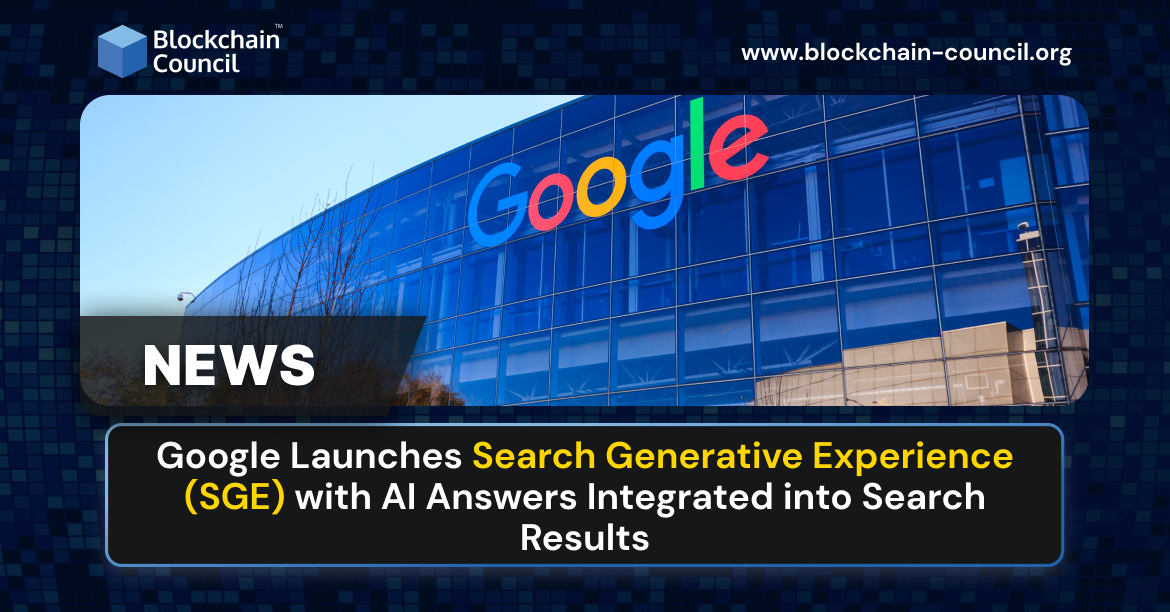
- Blockchain Council
- May 29, 2023
Google’s Search Generative Experience (SGE) has introduced an exciting new dimension to the world of search engines. By seamlessly integrating generative AI into the search results, Google is transforming the way users interact with information. Unveiled at the highly anticipated Google I/O 2023 event, SGE promises to revolutionize the search experience by providing users with AI-generated snapshots and key insights tailored to their specific queries.
What sets Search Generative Experience (SGE) apart is its ability to handle complex and multi-step questions that traditionally require users to sift through multiple search results. Instead of a list of blue links, SGE presents users with concise summaries extracted from various sources. These summaries, color-coded for easy identification, are generated by advanced language models like Pathways Language Model 2 (PaLM2) and Multitask Unified Model (MUM), ensuring that users receive comprehensive and reliable answers.
But SGE goes beyond presenting information; it also offers features that enhance and corroborate the data. Users can click the “expand button” to access a more detailed version of their query. This expansion reveals additional insights and allows users to explore the topic further. Moreover, SGE’s conversational capability enables users to ask follow-up questions, promoting a deeper understanding of the subject matter.
In addition to providing snapshots and facilitating expanded discussions, SGE leverages Google’s Shopping Graph to offer personalized recommendations. Suppose you’re searching for a laptop with specific features under $1,000. SGE will compile a list of recommended devices based on your query, considering factors such as storage capacity, RAM, and display type. Sponsored products may also be included in the results, ensuring a comprehensive range of options.
Also read: Google’s Project Starline: Next-Level Remote Teleconferencing with AI-Powered 3D Visuals
SGE also caters to developers with its Code Tips feature. Whether you’re working with C, C++, JavaScript, Kotlin, Python, or other programming languages, SGE can provide valuable guidance. Leveraging Google’s language models, it offers useful suggestions and pointers to help developers enhance their coding efficiency and proficiency.
Another remarkable feature of SGE is its ability to organize search results into a spreadsheet-like format. Users can bookmark articles, share them with others, and even export data directly into Google Sheets. This functionality streamlines information organization and promotes collaboration among users.
To access the benefits of Search Generative Experience (SGE), users can sign up for the Search Labs program. While all users can eventually gain access to SGE, Google One subscribers with a premium subscription of 2TB or higher will enjoy priority access. By enrolling in the program, users can unlock the full potential of this revolutionary search experience.
It’s important to note that SGE is not intended to replace other AI chatbots or search engines. Instead, it complements existing search functionalities by addressing complex queries and facilitating meaningful interactions with search results. Google’s aim is to make search more intuitive, informative, and visually engaging, enabling users to explore various topics and gain valuable insights effortlessly.
Also read: The Ultimate ChatGPT Guide: All You Need to Know
With the integration of generative AI, users can expect improved natural language understanding, allowing for nuanced questions and contextually relevant answers. SGE empowers users to explore related topics, discover new viewpoints, and unlock deeper insights that might have previously eluded them.
Google’s entry into generative AI represents a significant strategic shift in response to advancements made by competitors in the AI space. While Google quickly introduced its AI chatbot, Bard, in response to Microsoft’s OpenAI investments, the integration of generative AI into Search marks a major milestone. Google’s goal is to enhance the search experience by leveraging AI and large language models, enabling users to access information more efficiently and comprehend complex concepts effortlessly.
Google’s foray into generative AI is a significant strategic shift, responding to the advancements made by competitors in the AI space. While Google quickly introduced its AI chatbot, Bard, in response to Microsoft’s OpenAI investments, the integration of generative AI into Search represents a major milestone. Google aims to enhance the search experience by leveraging AI and large language models, enabling users to access information more efficiently and comprehend complex concepts effortlessly.
Also read: Bing Moves to Open Preview, Expands Visual Search and Chat Features





































































 Guides
Guides News
News Blockchain
Blockchain Cryptocurrency
& Digital Assets
Cryptocurrency
& Digital Assets Web3
Web3 Metaverse & NFTs
Metaverse & NFTs
